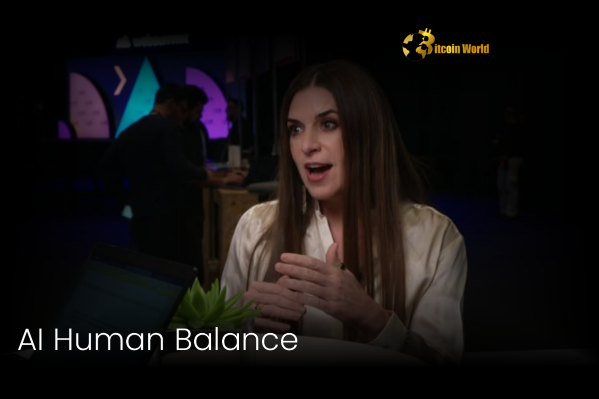AI Human Balance: Essential Human Oversight Crucial, Says Lattice CEO
0
0
BitcoinWorld

AI Human Balance: Essential Human Oversight Crucial, Says Lattice CEO
In the rapidly evolving landscape of technology, where AI is reshaping industries at an unprecedented pace, discussions about its impact on human roles are more critical than ever. For the tech-savvy audience navigating this change, particularly those interested in cryptocurrencies and the broader digital frontier, understanding how AI integrates with human effort is key. Sarah Franklin, the CEO of Lattice, a prominent employee performance software company, offers a compelling perspective on finding the right AI human balance, emphasizing that human oversight isn’t just beneficial – it’s essential.
Finding the Crucial AI Human Balance
Speaking at SXSW London and in an interview with Bitcoin World, Franklin highlighted the importance of the word ‘balance’ when it comes to companies adopting AI technologies. While the allure of AI for cost savings and efficiency is undeniable, Franklin stresses that simply replacing large numbers of human workers might not be the winning strategy in the long run. Lattice, her company valued at $3 billion, is itself integrating more AI and automation features, but with a clear philosophy: putting people first.
The conversation around AI human balance often pits automation against employment. However, Franklin argues that the most successful companies will be those that view AI as a tool to augment human capabilities, rather than replace them entirely. This involves retaining human employees and equipping them with AI assistants or ‘agents’ that enhance their productivity and insights.
Building a Human-Centric AI Approach
Franklin poses a fundamental question for leaders considering AI adoption: ‘Are you building for the success of the AI first [or are] you building for the success of the people and your customers first?’ This question cuts to the heart of a human-centric AI strategy. She argues that while efficiency is valuable, it should never come at the expense of trust. Trust, according to Franklin, is the most important currency a company possesses, and it is built by prioritizing the needs and experiences of customers and employees.
Trading out human interaction for pure automation might offer short-term cost benefits, but it risks eroding the trust that customers place in a company. A human-centric AI approach ensures that technology serves people, not the other way around, fostering stronger relationships and sustainable growth.
Ensuring Responsible AI Human Oversight
Beyond just balance, Franklin also laid out key principles for responsible AI implementation, focusing on the necessity of AI human oversight. These principles include:
- Transparency: Companies must be open with employees about what AI systems are doing and how they are being used.
- Accountability: AI should be applied narrowly to specific goals, making its function understandable. Ultimately, humans must remain accountable for the outcomes and impacts of the AI.
- Responsibility: Leaders and companies have a responsibility to ensure AI is developed and used in ways that benefit society and its people.
Without this clear AI human oversight, Franklin warns, companies risk becoming subservient to the technology rather than having the technology serve human goals.
AI and Jobs: Augmenting the Workforce
The discussion around AI and jobs is often framed negatively, focusing on potential job losses. However, Franklin’s perspective, reflected in Lattice’s own practices, is about augmentation. She shared that Lattice has developed an AI HR agent designed to provide proactive insights and assist employees with tasks like preparing for one-on-one meetings. Lattice also offers a platform allowing clients to create custom AI agents tailored to their specific business needs.
This approach demonstrates how AI and jobs can coexist and thrive, with AI handling routine tasks and providing data-driven support, freeing up human employees to focus on higher-level strategic thinking, complex problem-solving, and crucial human interaction.
The Future of Work is Grounded in Human Connection
Ultimately, Franklin believes that the victors in this era of rapid AI advancement will be those who understand and prioritize the human element. The future of work, she argues, is not about replacing people, but about leveraging technology to enhance human capabilities and preserve the irreplaceable value of human connection.
Retaining human oversight and ensuring that AI serves people are, in her view, among the most important guardrails companies can put in place. This vision for the future of work is one where technology empowers, rather than displaces, the human workforce, recognizing that empathy, creativity, and complex judgment remain uniquely human strengths.
In conclusion, Sarah Franklin’s insights from SXSW London and her conversation with Bitcoin World offer a vital reminder for businesses navigating the AI revolution. Achieving AI human balance through transparency, accountability, and a steadfast commitment to putting people and customers first is not just an ethical choice; it’s a strategic imperative for building trust and ensuring success in the future of work. The companies that master AI human oversight and adopt a truly human-centric AI approach, understanding that AI and jobs can be complementary, will be the ones that truly win.
To learn more about the latest AI trends, explore our articles on key developments shaping AI features and institutional adoption.
This post AI Human Balance: Essential Human Oversight Crucial, Says Lattice CEO first appeared on BitcoinWorld and is written by Editorial Team
0
0
 Manage all your crypto, NFT and DeFi from one place
Manage all your crypto, NFT and DeFi from one placeSecurely connect the portfolio you’re using to start.





